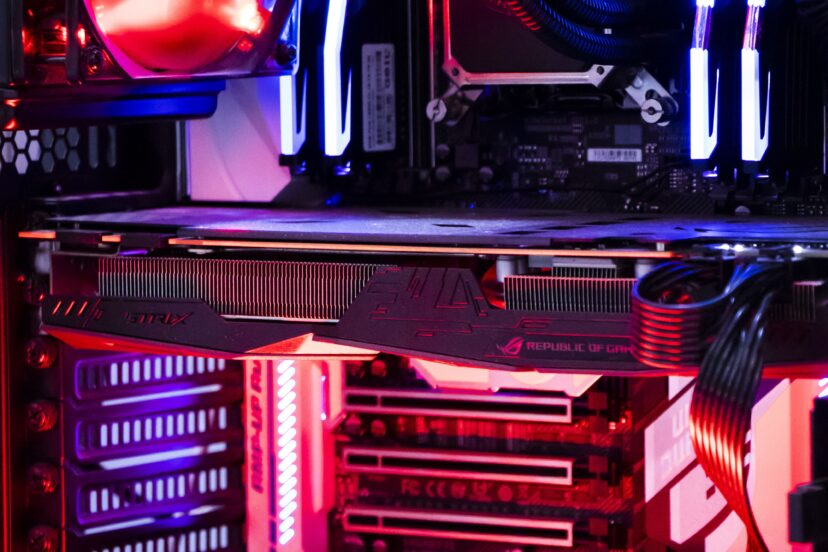What Is Gaming Behavior? 10 Interesting Definitions
Are you curious about the concept of gaming behavior? In this article, we will explore the intricacies of this phenomenon and delve into its various aspects. Whether you are an avid gamer or simply interested in understanding the psychology behind playing games, this article will provide you with a comprehensive overview of gaming behavior and its impact on individuals. So, sit back, relax, and let’s ask the question: What is gaming behavior?
Gaming behavior refers to the way individuals engage in video games and the patterns of their play. It involves the various actions, strategies, and attitudes that gamers adopt when playing games. Gaming behavior can be influenced by personal, social, and environmental factors, and it can have both positive and negative effects on individuals’ well-being.
Understanding gaming behavior is important as it helps researchers, psychologists, and game developers gain insights into how gaming impacts individuals and society as a whole. In this article, we will delve deeper into the different aspects of gaming behavior, its types, factors influencing it, positive and negative effects, motivations, age groups, physical well-being, gender differences, and psychological aspects.
Understanding Gaming
Gaming has become a popular form of entertainment worldwide, with millions of people engaging in video games. It involves playing electronic games on various platforms such as consoles, computers, or mobile devices. Gaming behavior encompasses both the frequency and intensity of gameplay, as well as the attitudes and emotions associated with it. Understanding gaming entails examining the motivations behind playing, the types of games individuals engage in, and the impact of gaming on their lives.
Defining Gaming Behavior
Gaming behavior refers to the patterns of play exhibited by individuals when engaging in video games. It encompasses the various actions and strategies employed by gamers to achieve their goals within the game. It also includes the attitudes and beliefs individuals hold towards gaming, such as their expectations of enjoyment, competition, or social interaction. Examining gaming behavior helps researchers and psychologists gain insights into the cognitive, social, and emotional processes involved in gaming.
Types of Gaming Behavior
Gaming behavior can be categorized into different types based on the motivations and preferences of gamers. Understanding these types helps in identifying the different ways individuals engage with video games and the potential effects on their well-being.
Casual Gaming
Casual gaming refers to playing video games on an infrequent basis and for short durations. Casual gamers often engage in simple and non-competitive games that require minimal time commitment. They play for leisure and relaxation, and the primary motivation is to have fun and kill time. Casual gaming is popular among individuals who enjoy gaming as a form of recreational activity without the need for deep immersion or long-term commitment.
Competitive Gaming
Competitive gaming involves participating in video game competitions and tournaments, either individually or as part of a team. Competitive gamers aim to improve their skills, achieve high rankings, and win against other players. The motivation for competitive gaming stems from the desire for achievement, recognition, and the thrill of competition. Competitive gaming requires dedication, practice, and a competitive mindset.
Problematic Gaming
Problematic gaming refers to excessive gaming behavior that negatively impacts individuals’ well-being and everyday functioning. It is characterized by an uncontrollable urge to play video games, neglect of other responsibilities, and withdrawal from social activities. Problematic gaming can lead to addiction, poor mental health, and impaired academic or occupational performance. It is essential to distinguish between healthy gaming behavior and problematic gaming to ensure the well-being of individuals who may be at risk.
Factors Influencing Gaming Behavior
Gaming behavior can be influenced by various factors, including personal, social, and environmental factors. These factors play a crucial role in shaping individuals’ motivations, preferences, and attitudes towards gaming.
Personal Factors
Personal factors, such as personality traits, cognitive abilities, and gaming experience, can influence gaming behavior. Personality traits like extraversion and openness to experience may determine the extent of gamers’ social interactions in online gaming. Cognitive abilities, such as problem-solving skills or reaction time, can impact individuals’ performance in different game genres. Past gaming experience can shape preferences for specific game types and influence the level of engagement individuals have with gaming.
Social Factors
Social factors refer to the influence of social interactions and social norms on gaming behavior. The social environment, including family, peers, and online communities, can shape individuals’ attitudes towards gaming and their motivations for playing. Social support from friends and peers can enhance the enjoyment derived from gaming, while social pressure or norms may influence the time spent gaming or the types of games individuals choose to play.
Environmental Factors
Environmental factors, such as access to technology, availability of games, and cultural norms, can also influence gaming behavior. The accessibility and affordability of gaming devices and software can impact individuals’ engagement in gaming. Cultural norms and societal expectations may shape the acceptability and perceptions of gaming within a particular community. Additionally, the presence or absence of regulations and policies related to gaming can influence the behavior and attitudes of gamers.

Positive Effects of Gaming Behavior
Contrary to popular belief, gaming behavior can have positive effects on individuals’ cognitive, social, and emotional well-being. While excessive gaming can lead to negative outcomes, moderate and balanced engagement with video games can offer several benefits.
Cognitive Benefits
Playing video games can enhance various cognitive abilities, including problem-solving skills, spatial awareness, attention, and memory. Many video games require players to strategize, think critically, and make quick decisions, thereby stimulating cognitive processes. Additionally, certain genres of games, such as puzzle or educational games, can promote learning and knowledge acquisition.
Social Interaction
Gaming behavior can facilitate social interaction and foster the development of social relationships. Multiplayer online games provide opportunities for individuals to engage with friends, family, or other players worldwide. The cooperative or competitive nature of these games can promote teamwork, communication, and collaboration. Online gaming communities also offer a platform for individuals to connect, share experiences, and form friendships with like-minded individuals.
Emotional Well-being
Engaging in video games can have positive effects on individuals’ emotional well-being. Gaming provides an avenue for stress relief, relaxation, and escapism from everyday challenges. It can serve as a form of entertainment and emotional regulation, allowing individuals to express and manage their emotions in a controlled environment. Additionally, successful completion of goals or achievements in games can boost individuals’ self-esteem and sense of accomplishment.
Negative Effects of Gaming Behavior
While gaming behavior can have positive effects, excessive or problematic gaming can lead to negative outcomes. It is important to recognize and address these potential risks to ensure a healthy gaming experience.
Addiction
Problematic gaming can lead to addiction, characterized by a loss of control over gaming habits and significant negative consequences in various life domains. Gaming addiction can result in neglect of personal relationships, decline in academic or work performance, and withdrawal from other activities. Individuals with a predisposition to addictive behaviors may be more susceptible to developing gaming addiction.
Health Issues
Excessive gaming behavior can contribute to various health issues, primarily related to a sedentary lifestyle. Spending prolonged hours sitting and playing video games can lead to musculoskeletal problems, such as back pain, obesity, or posture-related issues. Additionally, inadequate sleep and poor dietary habits associated with gaming addiction can have detrimental effects on physical health.
Academic Performance
Problematic gaming can negatively impact academic performance, particularly among children and adolescents. Excessive gaming behavior may lead to reduced time and effort dedicated to studying, resulting in poor grades and educational outcomes. It is crucial to find a balance between gaming and academic responsibilities to ensure the overall well-being and success of individuals.

Understanding Gaming Motivations
Motivations play a significant role in driving gaming behavior. Individuals may have various intrinsic and extrinsic motivations for engaging in video games.
Intrinsic Motivations
Intrinsic motivations refer to the internal factors that drive individuals to play video games for their inherent enjoyment or satisfaction. This includes the pleasure of experiencing challenging gameplay, the joy of exploration or discovery, and the sense of achievement derived from overcoming obstacles within the game. Intrinsic motivations are often associated with immersive and narrative-driven games that provide a captivating and engaging experience.
Extrinsic Motivations
Extrinsic motivations involve external factors that drive individuals to play video games, such as rewards, competition, or social recognition. These include the desire to earn in-game rewards or achievements, the thrill of competing against others, and the recognition received from peers or online communities. Extrinsic motivations are often associated with competitive multiplayer games or games with a strong social component.
Achievement Motivations
Achievement motivations refer to the desire for mastery, accomplishment, and progression within the gaming context. Individuals with achievement motivations seek to overcome challenges, set goals, and improve their skills or rankings. This motivation can be fueled by the sense of satisfaction derived from reaching milestones, unlocking new content, or gaining recognition for one’s achievements. Achievement motivations are common among both casual and competitive gamers.
Gaming Behavior in Different Age Groups
Gaming behavior can vary across different age groups, with distinct patterns and preferences prevalent among children and adolescents, young adults, and older adults.
Children and Adolescents
Children and adolescents often engage in gaming as a form of entertainment and socialization. They tend to enjoy games that offer immersive experiences, colorful graphics, and simple gameplay. Multiplayer online games, educational games, and age-appropriate games are popular among this age group. It is crucial to establish healthy gaming habits and parental guidance to ensure responsible and balanced gaming behavior.
Young Adults
Young adults are a significant user group in the gaming community. They often seek immersive and challenging gaming experiences that cater to their interests and preferences. Competitive multiplayer games, role-playing games, and open-world exploration games are popular among this age group. Social interactions, collaboration, and online communities play a crucial role in their gaming experiences.
Older Adults
Gaming behavior among older adults has been on the rise in recent years. Older adults often engage in casual and puzzle games that offer mental stimulation and relaxation. They may enjoy games that promote social interaction, memory training, or brain exercises. Gaming can provide a means of entertainment, cognitive engagement, and social connections for older adults.

Gaming Behavior and Physical Well-being
Gaming behavior can have implications for physical well-being, primarily through its impact on sedentary behavior and through the emergence of active gaming.
Effects of Sedentary Gameplay
Excessive sedentary gameplay, characterized by long periods of sitting and minimal physical movement, can contribute to various health issues. It can lead to a sedentary lifestyle, increased risk of obesity, cardiovascular problems, and musculoskeletal disorders. It is essential to incorporate physical activity and breaks into gaming routines to mitigate the negative effects of sedentary gameplay.
Health Benefits of Active Gaming
Active gaming, also known as exergaming, involves playing video games that require physical movement or exercise. This form of gaming can provide an alternative to sedentary gameplay and promote physical activity. Active gaming can contribute to improved cardiovascular fitness, motor skills development, and overall physical well-being. Fitness-focused games, virtual reality experiences, and motion-based gaming consoles offer opportunities for individuals to engage in active gaming.
Gender Differences in Gaming Behavior
Gaming behavior can exhibit gender differences, influencing game preferences, play styles, and online interactions.
Game Preferences
Gender differences in game preferences are evident, with males and females often favoring different genres. Males tend to gravitate towards action, sports, and shooter games, whereas females are more inclined towards simulation, puzzle, and social games. However, it is vital to recognize that these preferences are not deterministic, and individuals may have diverse gaming preferences irrespective of their gender.
Play Style
Play styles can also vary between genders, with males often displaying more competitive and aggressive gameplay, while females may exhibit more cooperative or supportive play styles. These differences can be attributed to various social, cultural, and biological factors, but it is crucial to avoid generalizations and acknowledge the diversity of gaming behavior within each gender.
Online Interactions
Online interactions in gaming can be influenced by individuals’ gender. Females may face various challenges such as harassment, stereotyping, or exclusion in online gaming communities. It is important to foster inclusive and respectful online environments that promote diversity and equal participation among all gamers, irrespective of their gender.
Psychological Aspects of Gaming Behavior
Gaming behavior is intertwined with various psychological aspects that contribute to its appeal and impact on individuals.
Escapism and Entertainment
Gaming provides a form of entertainment and escapism, allowing individuals to immerse themselves in virtual worlds and temporarily detach from real-life stressors. The engaging narratives, rich visuals, and interactive gameplay can transport players to captivating and imaginative realms, offering an enjoyable and relaxing experience.
Identification and Role-Playing
Gaming behavior often involves identification with virtual characters and role-playing. Players may project aspects of their personality or aspirations onto game avatars, allowing them to explore different identities and experiences. Role-playing games provide a platform for individuals to engage in narratives, make meaningful choices, and shape the outcomes of their virtual adventures.
Social Identity in Online Gaming
Online gaming communities offer a space for individuals to forge social identities and connections. Gamers may form online personas, join guilds or clans, and participate in online activities that contribute to their sense of belonging and social affiliation. This sense of community and social identity can provide emotional support, friendship, and a shared sense of purpose for gamers.
As society continues to embrace gaming as a popular form of entertainment, understanding gaming behavior becomes increasingly important. By examining the different aspects of gaming behavior, including motivations, types, factors influencing it, positive and negative effects, age groups, physical well-being, gender differences, and psychological aspects, we can gain valuable insights into how to promote a healthy and balanced gaming experience. It is essential to recognize and address potential risks associated with gaming behavior while harnessing the positive aspects to enhance individuals’ well-being, creativity, and social interactions.
Conclusion: What is Gaming Behavior?
As we draw to a close on the topic of “What is gaming behavior?”, it’s clear that the subject is a multi-dimensional one, encompassing a range of activities, motivations, and psychological factors. Gaming behavior isn’t just about how often someone picks up a controller or how skilled they are at a particular game. It’s an intricate tapestry woven from the threads of social interaction, cognitive function, emotional engagement, and even ethical considerations.
The digital landscape of gaming has created a plethora of new behaviors, from social gaming where teams strategize together, to competitive gaming that tests the limits of skill and reaction. Even single-player experiences can deeply influence our behavior, encouraging problem-solving, narrative engagement, and emotional reactions. What we deem as ‘normal’ or ‘abnormal’ gaming behavior is often relative, shifting with societal norms, technological advancements, and our evolving understanding of mental health.
Additionally, gaming behavior has been subjected to a great deal of scrutiny, particularly when it comes to topics like addiction or its effects on aggression. However, it’s crucial to understand that gaming, like any other form of entertainment or hobby, varies greatly from person to person. While some may indulge in it to the point of it becoming a concern, for many others, it’s a rewarding experience that enriches their lives, enhances their social interactions, and even provides a canvas for learning and growth.
Understanding what constitutes gaming behavior also has implications beyond the individual. It affects how society views gaming, how the industry approaches game design, and how educators and policymakers think about the integration of gaming elements into other fields. As we continue to delve into the world of gaming behavior, it will be interesting to see how this understanding shapes not just the way we play, but the way we live, learn, and interact with the world around us.
In conclusion, when we explore the question, “What is gaming behavior?”, we’re not just asking about the actions taken in front of a screen. We’re delving into a complex world that bridges virtual experiences with real-world implications. Whether you’re a casual gamer or a dedicated esports competitor, understanding the multifaceted nature of gaming behavior can offer valuable insights into not just how we play, but also why we play—and what it all means for the broader landscape of human behavior.




